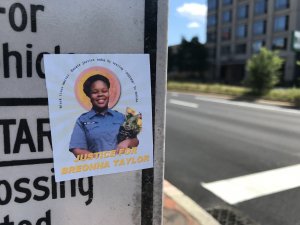Presented By: Eisenberg Institute for Historical Studies
Policing and Protest 2020

Note: The webinar has a Q&A format. We welcome your questions before via email (eihswebinar@umich.edu) and during the webinar via Zoom Q&A. This event will be recorded and available for future viewing online.
*Please register in advance here: https://umich.zoom.us/webinar/register/WN_qVR5E3VGRG2x_xJ4AK47AA
The killing of George Floyd, in the wake of the horrific and obscene history of the killings of unarmed black people by the police, has focused attention like never before on the systemic anti-black racism of the criminal-legal system in the United States. To be sure, the massive expansion and militarization of policing and incarceration are in some ways of comparatively recent origin. Yet they also have a much deeper origin in, and are inextricably connected to, a longer history of the judicial and extra-judicial violence against black people in the continent. The racist inequities of the criminal-legal system, indeed, are not a bug, but a feature.
Our panel of experts, scholars of the United States at the University of Michigan, will help us explore, beyond the headlines, the reach of the long arm of the carceral state in society as well as the challenges and opportunities that have been thrown up by the contemporary protests against the systemic violence of the state. The stakes for understanding the working of the carceral state are documented by the Documenting Criminalization and Confinement project of the University of Michigan’s Carceral State Project. However, the momentous protests against anti-Black racism as well as the broad public support they have received both within the United States and across the world—the clamor heard round the world—have also created a novel opportunity for implementing and imagining futures beyond a blatantly rigged carceral framework.
Panelists:
• Melissa Burch, Anthropology, University of Michigan
• Matthew Countryman, Afroamerican and African History, American Culture, History, University of Michigan
• Matthew Lassiter, History, Urban and Regional Planning, University of Michigan
• William D. Lopez, Health Behavior and Health Education, University of Michigan
Moderator:
• Mrinalini Sinha, History, University of Michigan
This event is part of the Thursday Series of the Eisenberg Institute for Historical Studies. It is made possible by a generous contribution from Kenneth and Frances Aftel Eisenberg.
*Please register in advance here: https://umich.zoom.us/webinar/register/WN_qVR5E3VGRG2x_xJ4AK47AA
The killing of George Floyd, in the wake of the horrific and obscene history of the killings of unarmed black people by the police, has focused attention like never before on the systemic anti-black racism of the criminal-legal system in the United States. To be sure, the massive expansion and militarization of policing and incarceration are in some ways of comparatively recent origin. Yet they also have a much deeper origin in, and are inextricably connected to, a longer history of the judicial and extra-judicial violence against black people in the continent. The racist inequities of the criminal-legal system, indeed, are not a bug, but a feature.
Our panel of experts, scholars of the United States at the University of Michigan, will help us explore, beyond the headlines, the reach of the long arm of the carceral state in society as well as the challenges and opportunities that have been thrown up by the contemporary protests against the systemic violence of the state. The stakes for understanding the working of the carceral state are documented by the Documenting Criminalization and Confinement project of the University of Michigan’s Carceral State Project. However, the momentous protests against anti-Black racism as well as the broad public support they have received both within the United States and across the world—the clamor heard round the world—have also created a novel opportunity for implementing and imagining futures beyond a blatantly rigged carceral framework.
Panelists:
• Melissa Burch, Anthropology, University of Michigan
• Matthew Countryman, Afroamerican and African History, American Culture, History, University of Michigan
• Matthew Lassiter, History, Urban and Regional Planning, University of Michigan
• William D. Lopez, Health Behavior and Health Education, University of Michigan
Moderator:
• Mrinalini Sinha, History, University of Michigan
This event is part of the Thursday Series of the Eisenberg Institute for Historical Studies. It is made possible by a generous contribution from Kenneth and Frances Aftel Eisenberg.